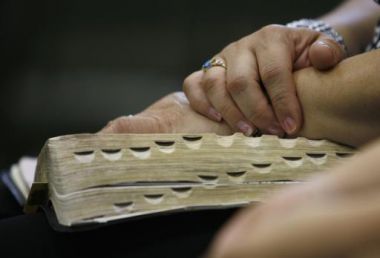Biblically engaged and biblically sceptical Americans equal for first time

A new study from the Barna Group reveals that for the first time, Americans who read the Bible enthusiastically and those who are sceptical are equal in number.
Out of 2,036 people surveyed across all fifty US states, 19 per cent fall into the biblically 'engaged' bracket, and 19 per cent are considered 'sceptical'. The number of sceptics has almost doubled from 10 per cent in 2011.
The study defines someone as 'engaged' if they read the Bible at least four times a week and believe it is the actual or inspired word of God.
Sceptics are defined as those who take the least sacred and most negative views of the Bible, who subscribe to the belief that "the Bible is just another group of teachings written by men that contains stories and advice".
The data about the sceptics reveals that 66 per cent are under the age of 48 and their gender breakdown is 68 per cent male to 32 per cent female.
While scepticism is noticeable for its rapid increase, the US's overall perception of the Bible remains favourable, with 56 per cent of respondents classified as 'pro-Bible'. The survey defines this as meaning that they believe the Bible is the actual or inspired word of God, and that it lacks errors.
The survey also revealed that 91 per cent believe the Bible encourages forgiveness, 88 per cent say it supports generosity, and 89 per cent say it teaches patience.
Sixty-two per cent believe that the Bible discourages war, 82 per cent say it condemns prostitution, and 60 per cent says it supports ending slavery.
The vast majority of Americans own a copy of the Bible, with 88 per cent of households owning at least one and the average number of Bibles per household reaching 4.7.
However, not all who like it and own it will spend time reading it.
Only 37 per cent of respondents reported they had read the Bible once in the last week. Out of those who did read it, 57 per cent gave a lot of thought to how its teachings applied to their daily lives.
This lack of reading has not turned off Americans from desiring to read scriptures more, with 62 per cent reporting that they would love to be delving deeper into God's word, but they just cannot make the time.
Almost half of all respondents, 47 per cent, said that their number one frustration was not having enough time to properly read the Bible. The number saying that in 2013 was 40 per cent.
Among those who said their Bible reading had decreased, 40 per cent chalked this up to busyness, 17 per cent reported a major life change, 15 per cent said it was because they had become either atheist or agnostic, 13 per cent said it was because of a traumatic event that caused them to doubt God, and 8 per cent reported that it was because they had seen the Bible make little difference in someone else's life.
One of the most harrowing statistics in the report is the number of people who, when reading the Bible, do not feel that it brings them closer to God. In 2011 that number was 64 per cent, but in 2014 it has dropped to 56 per cent.
In 2011 only 26 per cent of people said that they agreed with the statement "the Bible brings me comfort or helps solve my problems". In 2014 that number increased to 32 per cent.
While 81 per cent of Americans believe that the nation's morality is in decline, only 26 per cent attribute that to lack of Bible reading, and while half of Americans overall believe that the Bible has too little societal influence, that view is only shared by 30 per cent of those aged under thirty.
Those under thirty, labelled Millennials, are notable for their lack of interest in the Bible which is revealed when their responses are compared to responses for all Americans.
On Bible ownership, 80 per cent of Millennials own a Bible compared to 88 per cent of all Americans.
Only 35 per cent of Millennials believe the Bible contains what is needed for a meaningful life, compared to half of Americans in total, and as many as 39 per cent have never read the Bible at all, compared to only 26 per cent of all Americans.











